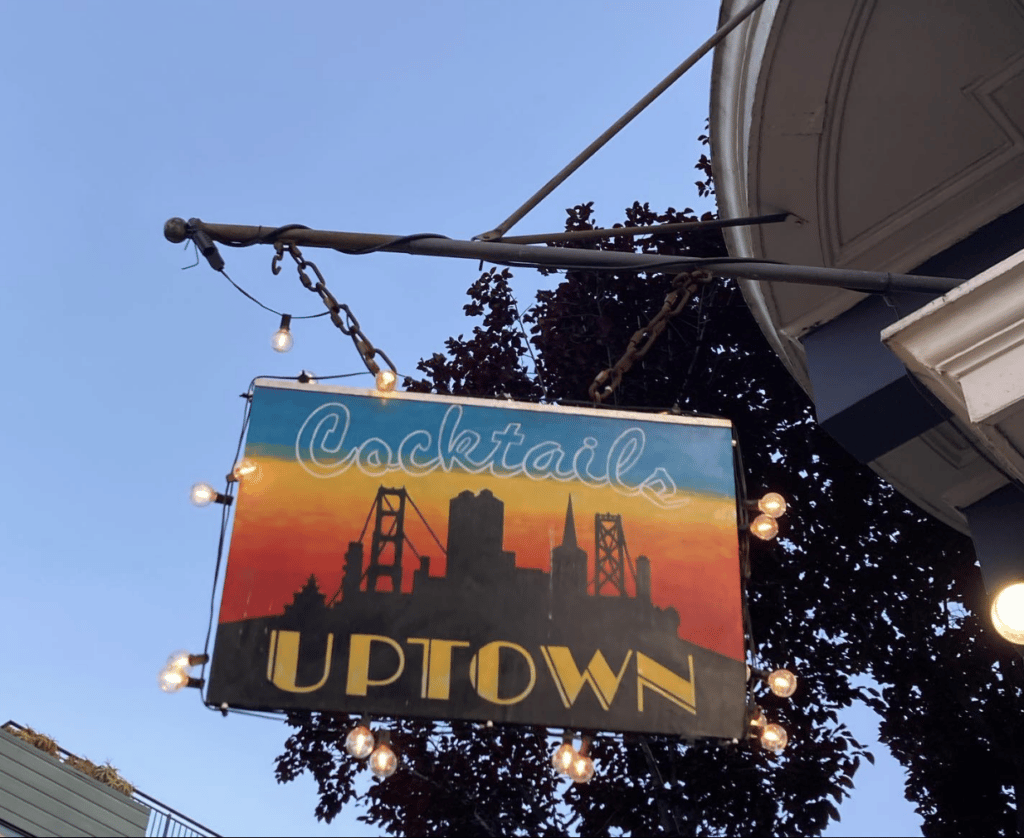
Photo from the Uptown’s IG page.
We began a tradition of bowing to each other.
Back when I started working Monday comedy nights at the Rite Spot, it became a regular habit to stop off at the Uptown on my way via the train from Oakland. Like many long time bartenders, my morning is primarily spent in solitude. I’ll read the news, clean the house, contemplate the day and then, when the afternoon descends, off to the city I go – often having spoken to no one. So it helps to have a little human to human time before human time is on the clock.
Then one Monday, par this peculiar routine, I happened to encounter a very great human. I am speaking, of course, about Clark Emmet – Trans bartender extraordinaire!
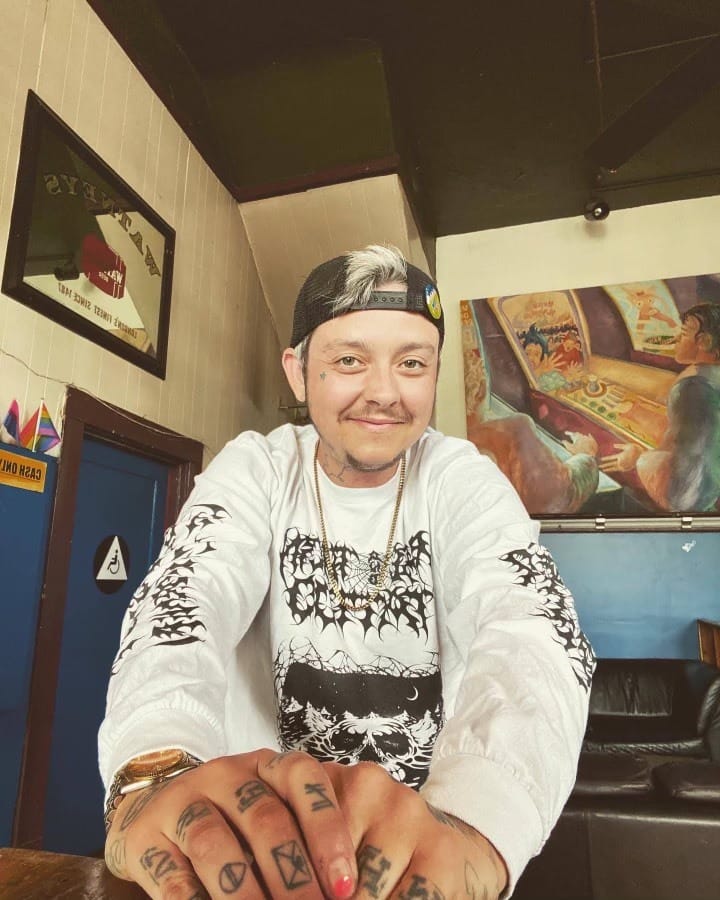
Clark
Clark is a great bartender regardless and being publicly trans is a very important proud part of not only who he is but how he presents as a bartender. But I will also argue that, fighting personally and societally to be recognized, creates a potential for being one who also greatly recognizes and gives care. Because there are grumpy bartenders. There are notoriously soused bartenders – Clark is sober. There are sexy bartenders who rely solely on the fact that being pretty is enough. There are young bartenders who still have much to learn about how much humanness this work requires. The people of the world come to us, often broken, weary or just seeking safety. So when one meets a unicorn bartender who is aware of all the possible circumstances behind the simple order of a drink, you stand up and take notice. Then…you bow.
The Uptown is not generally considered to be a queer bar or rather, it hasn’t been billed as such, but it has been a neighborhood corner joint since 1910. According to researcher Robby Virus of Project Pimento, “The building has always been a bar since the building went up during reconstruction in the Mission following the 1906 Earthquake”.
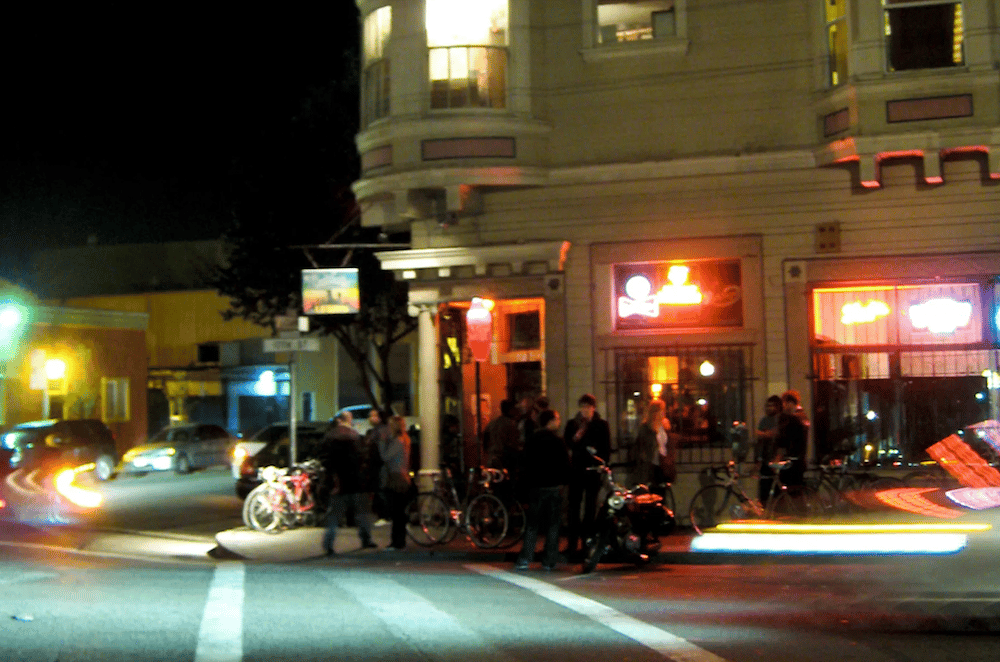
Awesome night photo of the Uptown by Ariel Dovas via Flickr
The original owner was German immigrant Henry Schlichtmann who built the place and lived in the apartment above. Schlichtmann died in 1920 and left the bar to his widow Albertine who sold the business a few years later to John Rippe, which was then listed as serving “refreshments and soft drinks”. After the prohibition repeal in 1934, Michael McGovern bought the building and called it the Old Corner Inn. With gaps of ownership, it looks like the McGovern’s maintained the building and business until 1977 when Louisa Albright took over the bar and changed the name to the Chicago Saloon.
I’ve heard tell from Ken Cohen, who is a great man about town and part of the co-ownership of the bar since it gained Legacy Status, that before Scott Ellsworth took over the space in 1983 and named it the Uptown, it was a lesbian bar. Thus the importance of naming it the Chicago Saloon. For those not in the know, Chicago had a significant, thriving and even famous queer population.
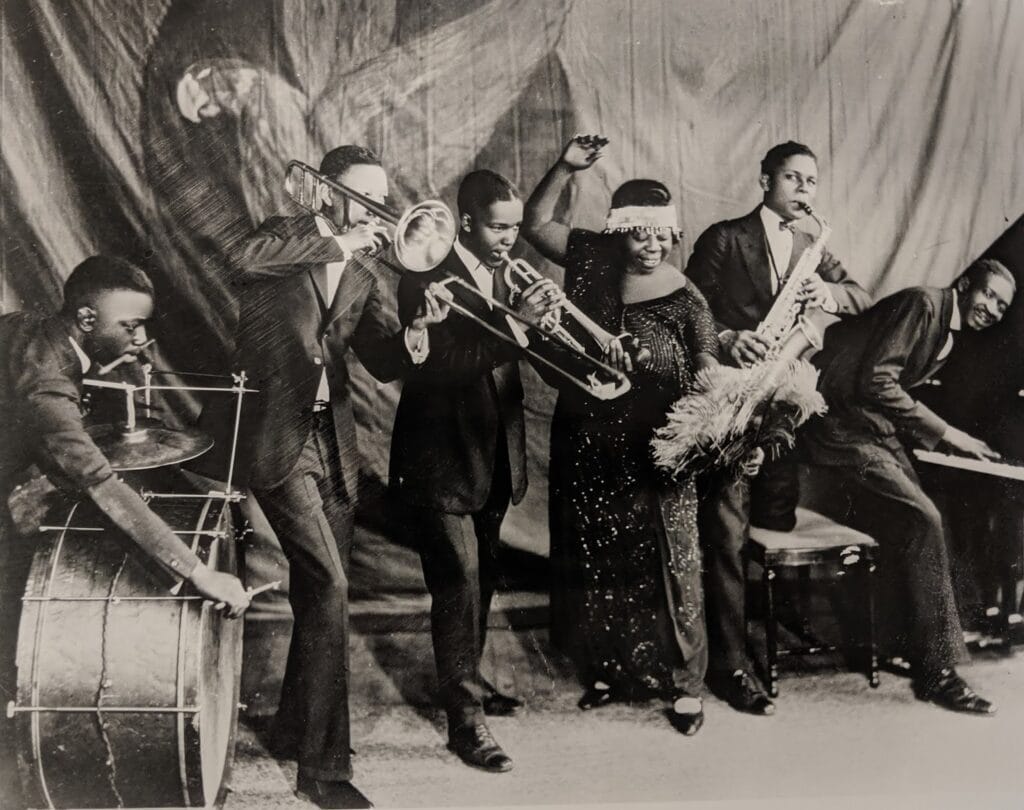
Ma Rainey and the Wildcats Jazz Band, 1923. Ma Rainey was famously arrested for holding a “lesbian party” in Chicago. Bernice Johnson Reagon Collection, Archives Center, National Museum of American History
That these bars, frequented by illustrious figures, were regularly raided and the patrons were not only arrested but assaulted by police is a terrible part of that history and one that continued for decades all over the country, including in San Francisco.
When Albright took over the bar in 1977, homosexuality was still criminalized. A mile away from Capp street and a decade earlier, Transwomen at the Compton Cafeteria in the Tenderloin rightly rioted. According to reports, it started with a certain and fierce Donna Personna who threw a cup of coffee in the face of yet another police officer who was trying to harass and shut them down. Donna Persona has since been the Grand Marshall for Pride and is quoted by Sam Levin in the Guardian as saying about that her thoughts in that moment of fighting back, “Fuck that shit … Give me my rights.”
This revolt happened three years before Stonewall and is covered wonderfully in the documentary ‘Screaming Queens: The Compton Cafeteria Riots‘ curated by local trans historian Susan Stryker.
On April 11, 1978, San Francisco Mayor George Moscone signed the Human Rights Ordinance. The ordinance banned discrimination based on sexual orientation in employment, housing, and public accommodations in the private sector. It was the first expansive legislation of its kind in the United States.
Albright had fostered a corner spot in San Francisco to create a queer place of honoring, in a somewhat lost landscape, slightly under the radar. Was there copious cheering in the bar when Moscone signed that bill? It being a time of only newspapers to record such momentous occasions and no cell phones, no televisions at the bar reporting news every minute and certainly no Twitter, a collective cheering in a singular moment may not have been possible. However, many of those who spent regular time at the Chicago Saloon likely attended City Hall on June 25th to hear famously out and proud queer supervisor Harvey Milk, who had co-sponsored the measure, deliver his Hope speech.
(You can listen to the Hope speech right here).
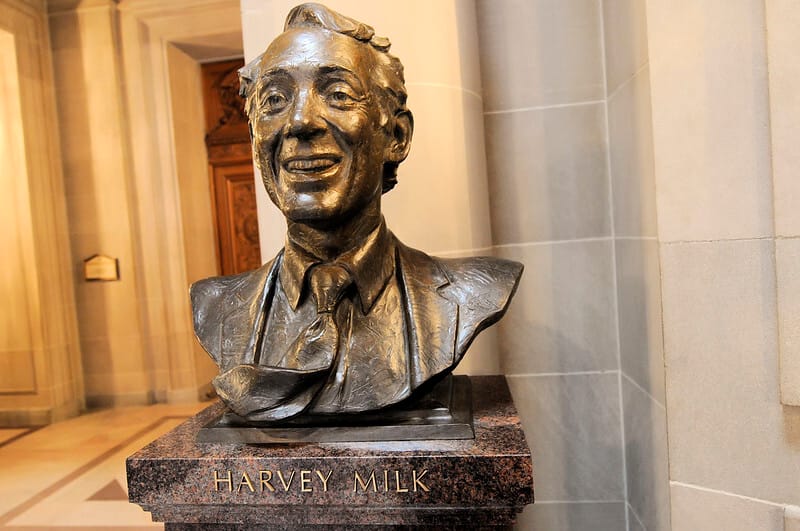
Harvey Milk Statue at San Francisco City Hall. Photo by Son of Groucho
Tragically in November of that same year, Milk and Moscone were murdered, shot down in City Hall and not in a wild west kind of way. They were murdered by the very same force of hatred that has precipitated more recent horrific violence.
There may have been crying in the bar then – a howling, angry, gut wrenching, bordering on hopeless – sobbing. I know that kind of crying well for a different era of politics, but to share it rather than be alone with the rage and sorrow is vital. This is why bars continue to be a very important part of our society.
On a cold Tuesday afternoon, I interviewed Clark while Tym Butler, the manager who also identifies as Queer, was setting up the lights in the parklet outside. Clark clarified the reason for the bow, “It’s the proper greeting – the bow. It stemmed from not wanting to name names out loud for privacy and safety reasons. The bar is a community center, especially for queer people. It’s so much more than serving alcohol. It’s about building a place. Helping to make each other feel seen”.
Now we do need to talk about that punk fellow from Chicago, Scott Ellsworth, who arrived in San Francisco in the 80’s amongst the ravages of the Summer of Love gone defunct. Punk then, was the only answer. In a fun twist, Scott actually used to work at the Rite Spot. But in 1983 he saw a corner bar up for lease and followed through on a decision that would affect many different lives. Because, in a truly punk ethos, he wanted it to be a place for everyone.
Ellsworth passed away in 2014, but is still a part of the essence of the Uptown. former employee Desmond Shea remembered him poignantly in this article by Shell Scott for the Bold Italic:
“He was a true Bohemian. He never wanted anything to change at the Uptown. He would never 86 anyone, or kick anyone out. He refused to change the artwork, which is so bad it has now become great. It took a lot of convincing for him to get rid of the puke-covered couches, or put toilet paper in the ladies’ room <…> He was a brilliant human being, studied English and philosophy at Oxford, a little-known fact. Scott had voluminous knowledge and a sharp mind that he somewhat hid behind drink. He could have a conversation with you about everything, anything”.
Ellsworth also funded Shea’s first business venture. “Scott was very hands-off, he let the employees run the show. I offered a $5 beer-and-a-haircut special, and once cut Warren Hinckle’s hair in the Uptown. It became very popular, and it was completely unsanitary. Hair all over the floor of the bar.”
What is much more fun to talk about is owners providing ground for the bartenders to run the show. Clark, who was hired by current managing partner and co-owner Shae Green in 2015, fresh from the Lexington, and took over organizing Uptown Homos said, “I’m a hugely queer person. When it’s your shift it’s your bar. You control the music. You take care of any possible danger. It was good for my vibe on a queer night at a bar that isn’t specifically queer. It’s casual. But still it’s my shift, my bar”.
That was also true at the Lexington though that bar had to be far more intense about who would be let in. Started in 1997, by Lila Thirkield because she recognized that there were many bars for gay men but few for queer women, she created a space that served lesbians of all stripes, including those in transition. I, though not fully queer, loved going there. I once witnessed one of the great bartenders throwing out a group of disrespecting straight men who thought they could indulge in…what? An isle of Lesbos in bar form? A field for their domination or exploitation or sheer scavenging? Am I being a bit humorous in this description and perhaps inflammatory? Sure. I will state for posterity that ‘respecting’ men were always allowed in. But what I most importantly understood that night was that I would be safe in that bar. That all those who gathered there would be safe in that bar.
I also experienced the amazing queer kinkstress Tina Horn do a performance on the pool table. Though a very brave soul who publicly advocates for rights, Horn was amongst friends that night because she had just been accepted to the graduate program at Sarah Lawrence which means that it wasn’t really a performance but rather an invocation of togetherness in support for the battles ahead.
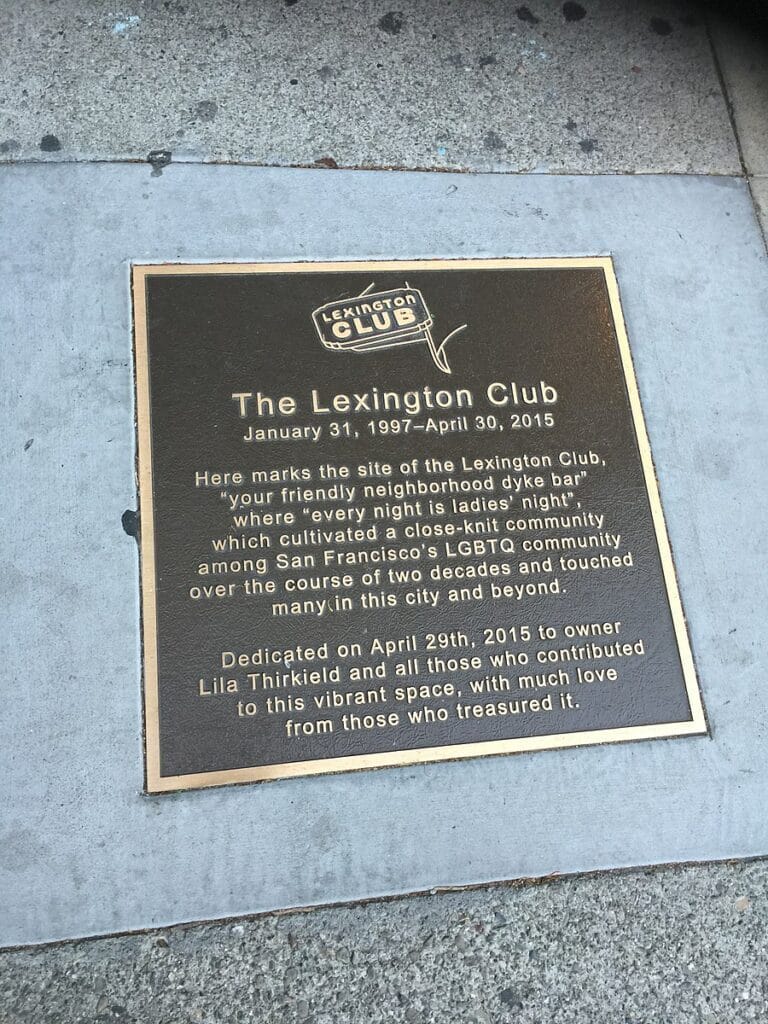
Photo by Melissa Hawkins via wikicommons
I asked Clark for a particular story about a moment when a queer person was so happy to be at the Uptown. His response was this, “More and more queers are coming, so much so that it is not unusual or surprising. There are birthday parties on the couches and presence in the pool room. They are taking up that space and are comfortable. I can’t tell you the amount of times that I’ve been pulled out of my head because someone is waiting so patiently for a hot toddy or something else that takes time and they share their story with me. Our two paths cross then and it is so meaningful. It’s a bucket of gold made of warmth and light. I am left with gratitude for days”.
Have I mentioned the ghosts? There are many at the Uptown apparently. According to Tym, shadowy figures are known to gather near the pool table. Certainly, there are presences in the basement, what old bar doesn’t have presences in the basement? But the most prominent ghost is the one who has their own bar stool. Beer delivery folks have experienced this particular shadow. While serving the first person to arrive for happy hour one afternoon, the ghost showed up as though they were just another customer and that person saw it, and ran out the side door. Tym, who is also one of those extraordinary unicorn bartenders, wasn’t fussed, he’s used to it. Maybe it’s Scott just coming by to say hello and nodding his head in approval at what the bar has come to be.
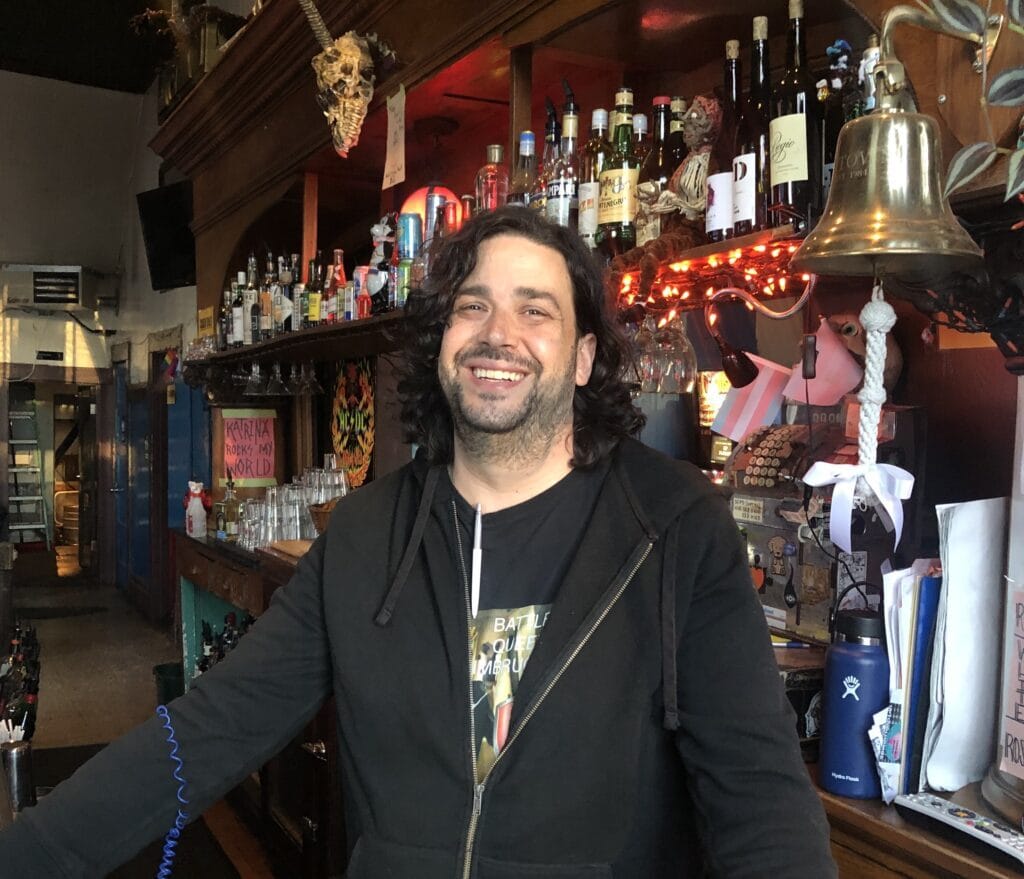
Tym behind the bar at the Uptown
A place where everyone comes together – young or old, punk or disco, queer or otherwise, celebrating the night or just stopping by on their way to work. We are not yet, in the bright glorious future where gender is of no concern, where queerness is not only accepted but commonplace and no longer under attack. But at least at the Uptown, a small version of this future exists where it is truly a gathering place for all and indeed, “it is magic”.
For that, may we always and forever bow.
The post The Little Known Queer History of San Francisco’s Uptown appeared first on Broke-Ass Stuart's Website.







